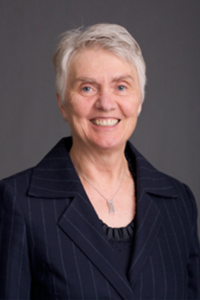Sue Ross

Professor of Law; Director, International Women’s Human Rights Clinic
Georgetown Law
Professor Ross teaches International and Comparative Law on Women’s Human Rights and is the Director of the International Women’s Human Rights Clinic, which she founded in 1998.In the Clinic, students work to advance women’s human rights through litigation, legislation, and human rights reporting in partnership with women’s NGOs in many developing countries, especially in Africa.She was also Director of the Sex Discrimination Clinic, where students litigated on behalf of victims of sex-based employment discrimination and domestic violence (1983-1998).Finally, she started and served as Director of the Women’s Law and Public Policy Fellowship Program (1983-1998) and its Leadership and Advocacy for Women in Africa Program (1993-1998).
Her most recent book, a first in its field, is Women’s Human Rights: The International and Comparative Law Casebook (2008), with an on-line documentary supplement, RossRights.com. She co-authored one of the first two casebooks on women’s rights issues, Sex Discrimination and the Law: Causes and Remedies(1975), as well as Sex Discrimination and the Law: History, Practice, and Theory(1996), focusing on remedies for sex-based employment discrimination.In other books and articles, she has written about parental leave, sexual harassment, domestic violence, polygyny as a violation of women’s human rights, and the role of fact-finding in advancing women’s human rights.
She served as Reporter to the Uniform Laws Commission’s Drafting Committee for a Uniform Act on Prevention of and Remedies for Human Trafficking, from 2011 to 2013, when the Act was adopted.She was also Co-Chair of the Special Committee on Gender for the D.C. Circuit Task Force on Gender, Race, and Ethnic Bias, which met from 1992-1995 and published its report in 1996.She served as Co-Chair of the Campaign to End Discrimination against Pregnant Workers from 1976 to 1978;in that capacity, she testified before Congress for enactment of the Pregnancy Discrimination Act of 1978, which was needed to reverse the Supreme Court’s holding in General Electric Co. v. Gilbert, 429 U.S. 125 (1976), that discrimination against pregnant workers was not prohibited sex discrimination within the meaning of Title VII of the 1964 Civil Rights Act.She was also a leading advocate for enactment of the Family and Medical Leave Act of 1993, testifying before Congress and helping to ensure that it provided leave to both women and men and not just women, as originally envisioned.
Before joining the faculty in 1983, she was Special Counsel for Sex Discrimination Litigation at the U.S. Justice Department’s Civil Rights Division, and before that the Clinical Director of the ACLU’s Women’s Rights Project.Other experience included work at the General Counsel’s office of the Equal Employment Opportunity Commission, and a year of private practice with Bellamy, Blank, Goodman, Kelly, Ross and Stanley.During those years, she also taught early women and the law courses as an adjunct at GW, NYU, Rutgers, and Columbia Law Schools;at GW, she was also a visiting professor.
At the Justice Department’s Civil Rights Division, her litigation resulted in Kentucky women prisoners gaining the right to equal vocational training programs with men and in thousands of Rhode Island mothers receiving more than $2,000,000 to compensate them for the state having denied them the PDA-required paid sick leave other workers received under a Rhode Island statute. Her ACLU Women’s Rights Project litigation helped establish women’s right to equal pension benefits with men, both at the federal trial level (Peters v. Wayne State University in 1979) and Supreme Court (Los Angeles Department of Water &Power v. Manhart in 1978).While a Hays Civil Liberties Fellow at N.Y.U. Law School, she wrote the ACLU amicus brief for Phillips v. Martin Marietta Corp., the Supreme Court decision that employers could not refuse to hire mothers –when they hired fathers –of pre-school age children, the Court’s first Title VII sex discrimination case.
Before law school, she was a Peace Corps volunteer in Ivory Coast (1965-1967), and her work with the International Women’s Human Rights Clinic has enabled her to work now with many prominent African women’s rights lawyers to advance women’s rights in their countries.Using human rights projects prepared by Clinic students under her leadership, Clinic partners have succeeded in winning new laws prohibiting domestic violence and sex-based employment discrimination in both Ghana and Uganda.In addition, in Ghana, they won new laws prohibiting trafficking and in Uganda, female genital mutilation.Victorious lawsuits in the Uganda Constitutional Court struck down sex-discriminatory laws concerning divorce (husbands could divorce for adultery, but wives could not), criminal adultery (married women could be prosecuted for adultery with an unmarried man, but married men were immune from such prosecution for adultery with an unmarried woman), and inheritance (e.g., intestacy provisions denied the surviving widow, but not the widower, ownership of the matrimonial home and lands; ownership was granted instead to the eldest son). In Tanzania, the Clinic and the Women’s Legal Aid Centre partnered to win a victory before the U.N. Committee on the Elimination of Discrimination against Women in 2015;it ruled that Tanzania’s customary law denying widows any inheritance, prohibiting women from inheriting clan land or administering estates, and granting sons much more personal property than daughters violated the Convention on the Elimination of All Forms of Discrimination against Women.
Education
B.A., Knox College; J.D., New York University